Zelle Fraud Lawsuit: Letitia James Takes Action Against EWS

The recent Zelle fraud lawsuit filed by New York Attorney General Letitia James has ignited significant attention as it exposes vulnerabilities within the popular payments network. According to the lawsuit, the operator, Early Warning Services (EWS), allegedly facilitated fraud by allowing scammers to pilfer over $1 billion from users during a six-year span. This alarming revelation highlights the purported lack of Zelle payment security and the absence of crucial safety features that could have prevented such widespread fraudulent activities. James’s office criticized EWS for neglecting to implement essential anti-fraud measures, ultimately transforming Zelle into a “hub for fraudulent activity.” As the lawsuit unfolds, it raises critical questions about the responsibility of payment providers in safeguarding their users’ finances from cyber threats.
The Zelle fraud lawsuit puts a spotlight on the increasing concerns surrounding digital payment systems and their ability to protect consumers. With the rise of peer-to-peer payment methods, issues related to online financial scams are becoming more prevalent, prompting inquiries into the accountability of services like Zelle. Attorney General Letitia James’s actions reflect the need for greater scrutiny and protective measures in the realm of electronic transactions. By highlighting flaws in the network operated by Early Warning Services, this case serves as a clarion call for enhanced security protocols and consumer protection strategies in digital finance. As more people turn to electronic money transfers, the effectiveness of anti-fraud regulations will be pivotal in fostering trust and safety in these platforms.
The Rise of Fraud in the Zelle Payment System
Fraudulent activities have increasingly targeted users of the Zelle payments network, raising alarms among financial regulators and consumers alike. A recent lawsuit filed by New York Attorney General Letitia James highlights how Zelle, operated by Early Warning Services (EWS), has become a hotspot for scams, allowing con artists to siphon off over $1 billion from unsuspecting individuals between 2017 and 2023. This alarming trend underscores the urgent need for enhanced security measures within the platform to protect users from devastating financial losses.
Consumers often utilize Zelle for its convenience, but the lawsuit reveals significant vulnerabilities inherent in its design. The lack of critical safety features and an unverified registration process have contributed to Zelle’s designation as a “hub for fraudulent activity.” As New York Attorney General Letitia James pointed out, EWS was aware of these issues and failed to take actionable steps to mitigate fraud, leaving users vulnerable to attack. This situation calls for an urgent examination of payment systems and the implementation of more robust anti-fraud measures.
Letitia James Lawsuit Against Zelle and EWS
The recent lawsuit filed by Letitia James represented a groundbreaking move in the ongoing battle against payment platform fraud. James’ office argues that Early Warning Services knew about Zelle’s susceptibility to scams yet neglected to adopt necessary precautions. The outcome of this lawsuit could set a precedent within the financial sector, prompting companies like EWS to prioritize the security of their payment systems, thereby shielding consumers from potential fraud.
In her press release, Letitia James emphasized the need for justice and restitution for those affected by the rampant fraud on Zelle, stating, “No one should be left to fend for themselves after falling victim to a scam.” Her commitment to implementing stricter anti-fraud measures could catalyze broader industry changes and foster a safer environment for electronic transactions. This lawsuit captures not just the immediacy of Zelle’s shortcomings but also the structural weaknesses existing in peer-to-peer payment systems inspired by the overarching quest for convenience over security.
Understanding Zelle Payment Security Concerns
Zelle’s rapid rise as a leader in peer-to-peer payment systems has come hand-in-hand with security concerns that are impossible to ignore. The lawsuit filed by New York Attorney General Letitia James against EWS underscores the critical need for safeguards that protect users from fraud. As consumers become more reliant on digital transactions, the absence of effective anti-fraud measures poses significant risks, leading to increasing skepticism about Zelle’s safety protocols.
Many users remain unaware of the vulnerabilities associated with Zelle, such as the lack of verification for new user registrations, which invites fraudulent activities. Such weaknesses not only compromise individual accounts but also erode the overall trust in digital payment platforms. For Zelle to maintain its competitive edge, it requires a comprehensive overhaul of its security measures, ensuring that users are adequately protected against malicious actors who exploit these weaknesses.
The Role of Early Warning Services in Zelle’s Frauds
Early Warning Services, the operator behind the Zelle payments network, has faced scrutiny following the alarming patterns of fraudulent activities reported by New York Attorney General Letitia James. The lawsuit highlights claims that these banking partners were aware of Zelle’s inherent risks and inadequately addressed them, thereby allowing scams to proliferate unchecked. This negligence raises serious questions about the responsibility of such organizations to protect their customers from fraud.
As the lawsuit unfolds, the implications for Early Warning Services could be substantial. A court ruling in favor of the Attorney General could compel EWS to implement more stringent anti-fraud measures, thereby altering its operational framework. With growing public concern over digital payments and security, the pressure mounts on EWS to adapt and ensure that users can safely use Zelle without the fear of scams that have led to significant financial losses.
Implications of Zelle’s Security Shortcomings
The implications of Zelle’s security shortcomings extend far beyond individual users and their finances. New York Attorney General Letitia James’s lawsuit against Early Warning Services not only poses potential financial penalties for the company but also invites increased scrutiny on the broader payments landscape. The accusations highlight systemic vulnerabilities that could influence regulatory practices and consumer perceptions across all peer-to-peer payment platforms.
If EWS is found liable for its negligence, it could prompt a wave of regulatory changes aimed at ensuring payment systems implement comprehensive security measures. The need for a safe digital transaction environment is paramount as more people shift to online financial services. Consumers deserve the assurance that platforms like Zelle will not only offer convenience but also robust protections against fraud, which are essential for maintaining trust in the financial system.
Consumer Response to the Zelle Fraud Allegations
In light of the allegations and the lawsuit filed by New York Attorney General Letitia James, consumers are left questioning the reliability of Zelle as a payment platform. While Zelle has positioned itself as a convenient solution for money transfers, the claims of widespread fraud and inadequate security measures can significantly impact user trust. Many consumers might reconsider their reliance on Zelle for transactions due to concerns about potential losses.
As users grapple with the implications of the lawsuit, financial institutions must prioritize transparency and communication regarding the security of their offerings. Zelle’s management needs to assure users that they are addressing these concerns seriously by implementing stringent, transparent measures to prevent fraud. The future of Zelle hinges on its ability to restore consumer confidence and safeguard their interests effectively.
The Future of Zelle Payments After the Lawsuit
The outcome of New York Attorney General Letitia James’s lawsuit against Zelle’s operator, Early Warning Services, could have significant ramifications for the future of digital payments. As the landscape of money transfers evolves, the need for secure platforms that employ advanced anti-fraud measures becomes imperative. This lawsuit may serve as a catalyst for Zelle to reassess its operational practices and implement changes to enhance user security.
Moving forward, the expectation among consumers will likely increase around payment networks, with a growing emphasis on security features and fraud prevention. The lawsuit can potentially lead to a shift in industry standards, where companies are obliged not only to offer convenience but also robust protections against fraudulent activities. The future of Zelle will depend heavily on its response to these allegations and its commitment to securing its platform for its users.
Importance of Anti-Fraud Measures for Peer-to-Peer Payment Systems
The necessity for comprehensive anti-fraud measures in peer-to-peer payment systems such as Zelle should be emphasized, especially in light of the recent fraud allegations presented in the lawsuit by Letitia James. As digital transactions surge in popularity, effective fraud prevention strategies must be a top priority for operators to ensure user trust and security. By implementing robust safeguards, payment platforms can not only safeguard users against threats but also bolster their reputations in a competitive market.
Moreover, as fraudsters continue to evolve their tactics, payment system providers like Zelle must adopt a proactive approach toward security. This can involve regular audits, user education about potential scams, and enhanced verification processes for new accounts. Establishing a stronger security framework will not only protect users but also foster a sustainable business model that emphasizes consumer reliance and trust in digital payment solutions.
Zelle’s Competition and the Need for Improved Security
The competition among digital payment platforms is fierce, and as fraud claims against Zelle become more prominent, the necessity for improved security measures will be paramount. Rivals to Zelle may capitalize on its vulnerabilities, using this opportunity to market themselves as safer alternatives. The New York Attorney General’s lawsuit against Zelle highlights the urgent need for companies to prioritize user security to remain competitive in a rapidly evolving landscape.
As Zelle competes not only with other peer-to-peer payment options but also with traditional banking methods, its ability to address security concerns will play a critical role in its long-term viability. Users will increasingly weigh their choices based on the perceived security of platforms, making it essential for Zelle to enhance its anti-fraud measures to sustain its market share and reassure existing and potential users.
Frequently Asked Questions
What is the Zelle fraud lawsuit filed by New York Attorney General Letitia James?
The Zelle fraud lawsuit, initiated by New York Attorney General Letitia James, claims that Early Warning Services (EWS), the operator of the Zelle payment network, facilitated fraud by allowing scammers to steal over $1 billion from users from 2017 to 2023. The lawsuit highlights that EWS created Zelle without critical safety features and failed to enforce necessary anti-fraud measures.
How does the Zelle fraud lawsuit relate to Early Warning Services?
The Zelle fraud lawsuit specifically targets Early Warning Services (EWS), which owns and operates the Zelle payments network. The lawsuit asserts that EWS was aware of Zelle’s vulnerabilities to fraud but did not implement basic safeguards, allowing fraud to proliferate on the platform.
What are the key allegations in Letitia James’ lawsuit against Zelle?
In her lawsuit, Letitia James alleges that Zelle became a hub for fraud due to its unverified registration process and that EWS and its partner banks failed to take action despite being aware of the growing fraud problem. The suit seeks restitution, damages, and a court order for Zelle to implement effective anti-fraud measures.
Why did the Consumer Financial Protection Bureau drop its lawsuit against Zelle and EWS?
The Consumer Financial Protection Bureau (CFPB) previously filed a lawsuit against Early Warning Services and banks associated with Zelle but withdrew it amid rising numbers of cases being dismissed under acting CFPB Director Russell Vought. The current lawsuit by Letitia James may be seen as a follow-up to that earlier action.
What impact could Letitia James’ Zelle fraud lawsuit have on payment security?
Letitia James’ Zelle fraud lawsuit could significantly impact payment security by potentially forcing Zelle and Early Warning Services to implement stronger anti-fraud measures. A court order for these changes may enhance user protection and mitigate risks associated with peer-to-peer transactions.
What statement did Zelle make in response to the fraud lawsuit?
Zelle responded to the fraud lawsuit by describing it as a “political stunt” and a “copycat” of the CFPB lawsuit. A Zelle spokesperson claimed that no investigation was conducted and emphasized that over 99.95% of Zelle transactions are completed without reports of scams or fraud.
What are the proposed outcomes of the Zelle fraud lawsuit?
The proposed outcomes of the Zelle fraud lawsuit include restitution for affected consumers, damages for the harm caused, and a court ruling that mandates the implementation of effective anti-fraud measures by Zelle and Early Warning Services.
How does Zelle’s payment security affect users?
Zelle’s payment security directly affects users by determining how well protected they are from fraud. The ongoing lawsuit by Letitia James highlights that the lack of adequate security features has left users vulnerable to scams, and improvements to Zelle’s security protocols could enhance user trust and safety in the platform.
| Key Points |
|---|
| The New York Attorney General filed a lawsuit against Early Warning Services, operators of Zelle, claiming it facilitated over $1 billion in fraud from 2017 to 2023. |
| The lawsuit alleges that EWS created Zelle without essential safety features, making it vulnerable to fraud. |
| Zelle’s unverified registration process contributed to it being a hub for fraudulent activity, with EWS and partner banks aware of ongoing fraud issues. |
| Attorney General James seeks restitution, damages, and a court order for Zelle to implement anti-fraud measures. |
| Zelle’s representative dismissed the lawsuit, claiming it misrepresents their investigation and highlights Zelle’s successful transaction rates. |
| In December, the CFPB also sued EWS and major banks over fraud investigation failures, but this lawsuit was later dropped. |
Summary
The Zelle fraud lawsuit highlights the serious concerns regarding the security features of the Zelle payments platform. With over $1 billion allegedly stolen due to fraud between 2017 and 2023, New York Attorney General Letitia James is pushing for accountability and remedial action against Early Warning Services. By seeking restitution and the implementation of necessary anti-fraud measures, the lawsuit aims to protect consumers from ongoing scams that have thrived on the inadequacies of Zelle’s registration system. This legal action represents a significant effort to ensure that financial technology platforms like Zelle operate with enhanced security to safeguard users from fraudulent activities.




